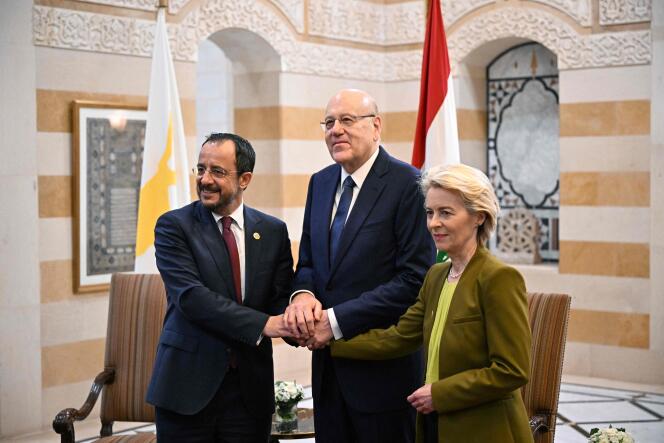
Ursula von der Leyen, president of the European Commission, announced on Thursday, May 2, alongside Cypriot President Nikos Christodoulides, that €1 billion in aid would be allocated "to contribute to Lebanon's socio-economic stability," in exchange for "good cooperation" from the Lebanese authorities in the fight against illegal immigration to Europe.
In response to Lebanese Prime Minister Najib Mikati, who urged the European Union (EU) to instead help Syrian refugees in Syria "to encourage them to return voluntarily," von der Leyen promised that the EU would be "exploring how to work on a more structured approach to voluntary returns to Syria, in close cooperation with UNHCR (the UN refugee agency)." She called for international support "for humanitarian and early recovery programs in Syria."
Lebanon believes it can no longer bear the burden of Syrian refugees, most of whom have fled the civil war since 2011. According to the Lebanese authorities, there are almost 2 million of them in Lebanon, representing a third of the country's population. Only 805,000 are registered with the UNHCR, which suspended registration of Syrians in 2015 at Beirut's request. Stricken by an economic crisis since 2019, Lebanon is calling on the international community to relocate them to other countries or help them return to Syria.
Intense lobbying
The president of Cyprus has lobbied the EU intensely to obtain this funding for Lebanon. Close to the Lebanese coast, the island has seen an influx of Syrian refugees since the outbreak of violence on the Israeli-Lebanese border, echoing the war in the Gaza Strip. Between January and mid-April, more than 3,000 people attempted to cross from Lebanon by sea, compared with 54 over the same period in 2023, according to the UNHCR.
Since February, Beirut has refused to take back undocumented Syrian refugees who have fled to Cyprus, despite an agreement to this effect signed with Nicosia. In response, the Cypriot authorities have suspended the registration of asylum applications by Syrians. The NGO EuroMed Rights has also accused the Cypriot coast guard of forcibly turning back at least three boats carrying asylum seekers from Lebanon, which the Nicosia authorities are denying.
EU funding for the period 2024-2027 will include €736 million in aid for education, social protection, and healthcare for Syrian refugees and vulnerable people in Lebanon. In addition, €264 million will be allocated to training and equipping Lebanese security forces to manage migratory flows. Most of these European funds will be allocated via international organizations. The international community has indeed made any direct support to the Lebanese state contingent on enacting economic and financial reforms.
You have 55.44% of this article left to read. The rest is for subscribers only.